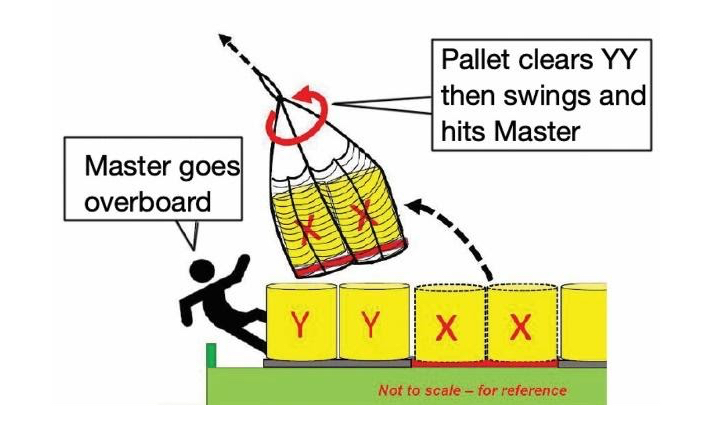The master of a supply boat has died after being knocked over board by a swinging load. The Nautical Institute discusses the incident in a Mars Report and points out some of the contributory ‘questionable decisions’. One of these was the master of the supply boat leaving the wheelhouse unattended during the cargo transfer.
The Nautical Institute gathers reports of maritime accidents and near-misses. It then publishes these so-called Mars Reports (anonymously) to prevent other accidents from happening. A summary of this incident:
A chemical tanker planned to take on stores while underway via a small re-supply boat. The weather was fine with a slight sea and swell and light winds.
The masters of the two vessels had agreed a rendezvous point and to undertake the ship-to-ship transfer operation on a heading of about 305° and at a speed of about four to five knots. The tanker’s crane would be used to bring the stores on board. The re-supply boat came alongside the tanker and, without any lines attached, the tanker’s crane’s hook was lowered and the first pallet (XX in the diagram) was hooked on and the lift started.
As the lift started, the re-supply boat began to veer away from the side of the tanker. The pallet, now partially lifted, was caught by another pallet (YY) on the deck of the re-supply boat. A crew member ran to the re-supply boat’s wheelhouse to inform the master to put more helm towards the tanker. The master said he had done that, and suggested that the sheer was due to the lift coming clear of the boat’s deck. The master then left the wheelhouse to try and help the deck crew clear the lift. The re-supply boat was still moving away from the tanker and the master realised they needed to abort the lift.
Before the lift could be lowered to the deck, it came free from the YY pallet, swinging toward the tanker and knocking the master overboard. Life buoys were thrown to the master, but he was unable to reach any of them. Search and rescue operations were initiated, but the master was not found. His body was recovered four days later.
Investigation finding
The investigation found, among other things, that neither the deck crew nor the master were wearing personal flotation devices, even though the gunwale was only 0.5 metres high meaning there was a considerable risk of falling overboard.
Advice from The Nautical Institute
- The decision to transfer stores while making way at four knots was questionable. It certainly comprised more risks than stopping and allowing the re-supply boat to secure lines fore and aft to the tanker before the lifts began.
- Leaving the wheelhouse unattended to help on deck was another questionable decision. The vessel was underway at four knots and in close proximity to the tanker.
- Working on the deck of the re-supply boat, which had very low gunwales, without personal flotation devices was a clear oversight in risk appreciation – another example of ‘risk in plain sight’.
Mars Reports
This accident was covered in the Mars Reports, originally published as Mars 202046, that are part of Report Number 334. A selection of this Report has also been published in SWZ|Maritime’s September 2020 issue. The Nautical Institute compiles these reports to help prevent maritime accidents. That is why they are also published on SWZ|Maritime’s website.
More reports are needed to keep the scheme interesting and informative. All reports are read only by the Mars coordinator and are treated in the strictest confidence. To submit a report, please use the Mars report form.








